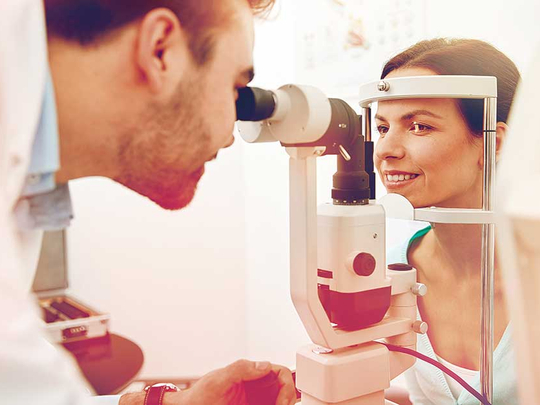
If you’re diagnosed with diabetes, you may not realise that the condition can cause damage to your eyesight, or more specifically your retina. The condition is referred to as diabetic retinopathy. As the condition develops, symptoms include blurred eyesight, impaired colour perception and dark spots in your field of vision. Ordinarily, the condition affects both eyes.
“Retinopathy as a term means any abnormality of the retina,” says Dr Muhammad Hamed Farooqi, Director and Consultant Endocrinologist, Dubai Diabetes Centre.
“Diabetic retinopathy is damage to the retina because of diabetes. It could be hypertensive retinopathy, which is damage to the retina due to high blood pressure, it could be age-related or it could be congenital, so there are many causes.”
The retina is a thin layer of tissue lining the back of the eye. It receives light that the lens has focused and converts these into neural signals that are sent to the brain. Due to the intensive role it plays in our everyday lives, the retina requires large amounts of energy. This can lead to damage if you are diabetic and suffering from hypertension because of failing to control your blood sugar levels.
“The retina, for the nature of work that it does, needs a lot of blood, energy and oxygen. When hypertensive damage occurs to the retina it is indicated by damage to the blood vessels such as narrowing of the blood vessels,” says Dr Farooqi.
At Dubai Health Authority, anyone who is diagnosed with type 2 diabetes is automatically assessed for diabetic retinopathy. “For people with type 2 diabetes, which is the majority of people who are diabetic, the moment they are diagnosed with diabetes, they should have an eye exam, which includes an examination of the retina,” explains Dr Farooqi.
“People who are diagnosed with retinopathy need to be checked quite regularly for the condition of their retina. There are no medications such as eye drops, which slow down the progression of retinopathy, so the main issue is blood glucose levels.”
Although the most effective way of controlling the development of diabetic retinopathy is to manage your blood sugar, some people can be more susceptible to the eye condition than others. “There are certain people who are more prone to retinopathy compared to others,” he says. “I have seen patients with very poorly controlled diabetes but with no abnormality of the retina.
Alternatively, I have seen people who have blood sugar levels that are minimally off their required levels and they have shown damage to the retina. I believe that the condition is also related to someone’s genetic make-up and that some people may be more predisposed to diabetic retinopathy than others.”
In the US, retinopathy affects between 40 and 45 per cent of diabetics. If you are diagnosed with the condition, in addition to managing your blood glucose levels, DHA recommends screening regularly to ensure the condition isn’t developing. The reason is once the retina is damaged, the deterioration is irreversible and can, in extreme cases, lead to loss of vision. “The reason we are so concerned about checking for retinal damage is because if a part of the retina is damaged, we can’t do anything about it,” says Dr Farooqi.
“The longer you live, the more likely you are to suffer from the cumulative effects of diabetes and therefore more likely to suffer from retinopathy. If you can control your blood glucose levels following a diagnosis of retinopathy, the progression of the condition will be minimal. However, if you do not control your levels, it can cause a rapid deterioration in your retina.”











